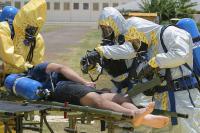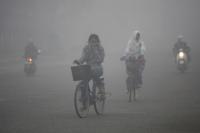-
A nerve agent antidote taken before a chemical weapons attack

Nerve agents are molecular weapons that invade the body and sabotage part of the nervous system, causing horrific symptoms and sometimes death within minutes. Few antidotes exist, and those that do must be administered soon after an attack. Now, scientists an early-stage development of a potential treatment that soldiers or others could take before such agents are unleashed.
-
-
New technology pinpoints water contamination sources

When the local water management agency closes your favorite beach due to unhealthy water quality, how reliable are the tests they base their decisions on? As it turns out, those tests, as well as the standards behind them, have not been updated in decades. Now scientists have developed a highly accurate, DNA-based method to detect and distinguish sources of microbial contamination in water.
-
-
Slowing the spread of infectious diseases
Outbreaks of infectious diseases such as Zika increasingly threaten global public health. Scientists expect five such new diseases to emerge each year. To find out whether our interaction with the environment is somehow responsible, the Ecology and Evolution of Infectious Diseases (EEID) program — a joint effort of the National Science Foundation (NSF), National Institutes of Health (NIH), and the U.S. Department of Agriculture (USDA) — has awarded $16.6 million in new grants. The scientists receiving the grants will study disease transmission among humans, other animals, and environment.
-
-
Florida tightens public notification rules for pollution incidents
Last week Governor Rick Scott instructed Florida Department of Environmental Protection (DEP) Secretary Jon Steverson to issue an emergency rule that establishes new requirements for public notification of pollution incidents. The rule is to take effect immediately. Scott issued the instruction following the sewage spill in Pinellas County and the sinkhole at Mosaic’s New Wales facility.
-
-
Massive 2014 West Virginia chemical spill was preventable: CSB
The Chemical Safety Board’s (CSB) final report into the massive 2014 release by Freedom Industries of chemicals into the primary source of drinking water of Charleston, West Virginia, concludes that Freedom Industries failed to inspect or repair corroding tanks, and that as hazardous chemicals flowed into the Elk River, the water company and local authorities were unable effectively to communicate the looming risks to hundreds of thousands of affected residents, who were left without clean water for drinking, cooking, and bathing.
-
-
Abnormalities found in drinking water in Texas’s Eagle Ford Shale region
Chemists studying well water quality in the Texas’s Eagle Ford Shale region found some abnormal chloride/bromide ratios, alongside evidence of dissolved gases and sporadic episodes of volatile organic compounds, all indicative of some contamination from industrial or agricultural activities in the area.
-
-
Radioactive wastewater enters Florida major aquifer after huge sinkhole opens up below fertilizer plant
At least 980 million liters of highly contaminated water — including radioactive substances – has leaked into one of Florida’s largest sources of drinking water. The leak was caused by a huge sinkhole which opened up beneath a fertilizer plant near Tampa. The sinkhole caused highly contaminated waste water to pass into an aquifer which supplies much of the state. The waste water contained phosphogypsum, a by-product of fertilizer production, which contains naturally occurring uranium and radium. the Floridan aquifer aquifer underlies all of Florida and extends into southern Alabama, Georgia, and South Carolina, supplying groundwater to the cities of Tallahassee, Jacksonville, Gainesville, Orlando, Daytona Beach, Tampa, and St Petersburg.
-
-
Smoke from 2015 Indonesian fires may have caused more than 100,000 deaths

In the fall of 2015, hazardous levels of smoke from agricultural fires blanketed much of Equatorial Asia. Schools and businesses closed, planes were grounded, and tens of thousands sought medical treatment for respiratory illness. In a new study, researchers estimate that the 2015 smoke event caused upward of 100,000 deaths across Indonesia, Malaysia, and Singapore.
-
-
How Congress is failing on Zika
Three times Congress has taken up legislation to fund the continuing response to the Zika outbreak. Three times the bill, which would allocate $1.1 billion to fight the disease, has fallen short of attracting bipartisan support. While Congress delays action on Zika, the number of infected people keeps climbing. As of mid-September, there were over 3,000 reported cases in the fifty states and close to 18,000 when you count in U.S. territories like Puerto Rico and the Virgin Islands. One thing the Zika crisis has made clear is that solving emerging disease outbreaks increasingly involves navigating treacherous political waters. Congress’ lack of understanding of the real scope of voucher program – which aims to spur development of new drugs for neglected diseases — compromises efforts to find new ways of encouraging R&D in neglected diseases like Zika. Its inaction when it comes to extending funding for a major outbreak may endanger the health of thousands of Americans.
-
-
Neglected Tropical Diseases: Some progress toward addressing the chronic pandemic
Neglected Tropical Diseases (NTDs) have been included in United Nations Sustainable Development Goals, and are now recognized as true markers of poverty. But there is still no recognition of the true level of mortality associated with this particular group of diseases. Around 12,000 people died as a result of the recent Ebola outbreak in Guinea, Sierra Leonne, and Liberia, but experts say that during the same period of time at least ten times that many people died as a result of NTDs.
-
-
Star-shaped polymers, not antibiotics, kill antibiotic-resistant bacteria
Currently, the only treatment for infections caused by bacteria is antibiotics. However, over time bacteria mutate to protect themselves against antibiotics, making treatment no longer effective. These mutated bacteria are known as “superbugs.” Tiny, star-shaped molecules are effective at killing bacteria that can no longer be killed by current antibiotics, new research shows. The research holds promise for a new treatment method against antibiotic-resistant bacteria, or superbugs.
-
-
Vaccine against “flesh-eating” bacteria in sight
Biochemists have uncovered patterns in the outer protein coat of group A Streptococcus that could finally lead to a vaccine against this highly infectious bacteria — responsible for more than 500,000 deaths a year, including toxic shock syndrome and necrotizing fasciitis or “flesh-eating disease.”
-
-
Climate, air travel maps identify countries in Africa, Asia at greatest risk of Zika virus
Many countries across Africa and Asia-Pacific may be vulnerable to Zika virus outbreaks, with India, China, the Philippines, Indonesia, Nigeria, Vietnam, Pakistan, and Bangladesh expected to be at greatest risk of Zika virus transmission due to a combination of high travel volumes from Zika affected areas in the Americas, local presence of mosquitos capable of transmitting Zika virus, suitable climatic conditions, large populations, and limited health resources. The authors of a new study say that identifying where and when populations would be most susceptible to local transmission of Zika virus could help inform public health decisions about the use of finite resources.
-
-
Zika reference strain sequenced; will help in diagnosis, screening
An international team of researchers has sequenced a strain of the Zika virus that will be used as a World Health Organization (WHO) reference strain to identify Zika virus infection in the blood, thus making it easier to diagnose the disease.
-
-
Water pollution across three continents poses health risks to hundreds of millions
Water pollution has risen across three continents, placing hundreds of millions of people at risk of contracting life-threatening diseases like cholera and typhoid. Pathogen and organic pollution rise in more than 50 percent of river stretches in Africa, Asia, and Latin America. Asia hit hardest by rise in severe pathogen pollution, with up to a half of all river stretches affected. Up to 323 million people on three continents at risk of infection from diseases caused by pathogens in water.
-
More headlines
The long view
We Ran the C.D.C.: Kennedy Is Endangering Every American’s Health
Nine former leaders of the Centers for Disease Control and Prevention (CDC), who served as directors or acting directors under Republican and Democratic administrations, serving under presidents from Jimmy Carter to Donald Trrump, argue that HHS Secretary Roert F. Kennedy Jr. poses a clear and present danger to the health of Americans. He has placed anti-vaxxers and conspiracy theorists at top HHS positions, and he appears to be guided by a hostility to science and a belief in bizarre, unscientific approaches to public health.
